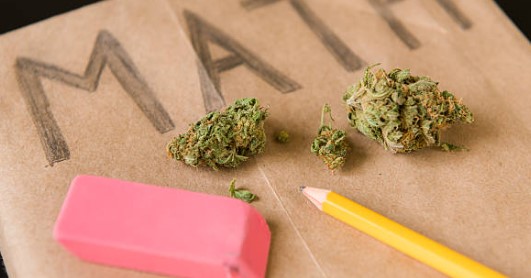Marijuana use in children and adolescents: consequences and how to help
Marijuana use at an early age can have serious consequences on the physical, cognitive and socio-emotional development of young people. These consequences include damage to neuronal pruning, impact on the reward circuit, limitation in social interaction, impairment of cognitive development, and other effects on important functions such as sleep, appetite, and mood.
Kids Up
5/6/20245 min read


Marijuana use in children and adolescents is a growing concern for many parents and caregivers. Marijuana, an illegal drug in most countries, can have detrimental effects on the development and health of young people. In this article, we will explore the consequences of marijuana use in children and adolescents, as well as the strategies recommended by specialists to help those who use regularly.
One of the main risks of marijuana use in young people is the negative impact on cognitive development. Marijuana affects brain function, especially in areas related to memory, attention and learning. Studies have shown that teens who regularly use marijuana have lower academic performance and may experience difficulty concentrating and retaining information. Additionally, early marijuana use can affect long-term brain development, which can have lasting consequences on cognitive function.
Another worrying aspect of marijuana use in children and adolescents is the effects on mental health. Marijuana may increase the risk of developing psychiatric disorders, such as depression and anxiety. Additionally, frequent marijuana use in adolescence has been associated with an increased risk of developing schizophrenia in adulthood. It is important to note that marijuana can have different effects on each individual, and some youth may be more susceptible to adverse mental health effects.
Given this problem, it is essential that parents and caregivers are informed about the risks of marijuana use in children and adolescents. It is important to have open and honest conversations with young people about the dangers of drugs and the negative effects they can have on their health and well-being. In addition, it is essential to foster a family environment that promotes healthy lifestyles and alternative activities to drug use.
If a child or teen is using marijuana regularly, it is important to seek professional help. Addiction specialists can provide appropriate evaluations and treatment to help youth overcome their marijuana use. Support from family and close environment also plays a crucial role in the recovery process.
Marijuana use in children and adolescents can have serious consequences on their development and health. It is essential that parents and caregivers are informed about the risks and seek professional help if their children are using regularly. With the right support, it is possible to help youth overcome their marijuana use and promote a healthy lifestyle.
In addition to the effects mentioned above, marijuana use in children and adolescents can also have other negative consequences on their health and well-being. One of the most important concerns is the impact on academic performance. Regular marijuana use can affect young people's ability to concentrate, retain information, and learn new concepts. This can lead to poor school performance and difficulties advancing in their education.
Another important consequence of marijuana use at an early age is the increased risk of developing mental health problems. Several studies have found an association between marijuana use in adolescence and an increased risk of developing psychiatric disorders, such as schizophrenia and bipolar disorder. These disorders can have a significant impact on young people's lives and require long-term treatment.
Additionally, marijuana use in adolescence can also have long-term consequences on physical health. Regular marijuana use can affect the respiratory system and increase the risk of developing lung diseases, such as chronic bronchitis and chronic obstructive pulmonary disease (COPD). It has also been associated with an increased risk of cardiovascular disease and sexual health problems.
It is important to note that the effects of marijuana use may vary depending on factors such as the amount and frequency of use, age of onset, and genetic predisposition. However, in general, marijuana use in children and adolescents is considered a risk to their development and well-being.
Marijuana use at an early age can have serious consequences on the physical, cognitive and socio-emotional development of young people. These consequences include damage to neuronal pruning, impact on the reward circuit, limitation in social interaction, impairment of cognitive development, and other effects on important functions such as sleep, appetite, and mood. Additionally, marijuana use in children and adolescents can also have a negative impact on academic performance, increase the risk of mental health problems, and have long-term consequences on physical health. Therefore, it is essential to educate youth about the risks associated with marijuana use and promote a healthy, drug-free lifestyle.
Continuing with strategies to help a child who regularly uses marijuana, it is important to also consider other options that may be beneficial for their recovery.
Educate about risks and consequences
It is essential to educate your grandchild about the risks and consequences of long-term marijuana use. Explain the negative effects it can have on their physical and mental health, as well as their academic and social development. Provide information based on scientific evidence and encourage them to do their own research.
Establish routines and structure
Creating routines and structure in your grandchild's life can go a long way toward reducing marijuana use. Establish regular times for meals, sleep, and daily activities. This can provide stability and a sense of control, which can help decrease the need to turn to marijuana as a form of escape.
Promote a drug-free environment
It is important to create a drug-free environment at home and in the community. This involves making sure there is no easy access to marijuana or other drugs, as well as encouraging healthy friendships and activities that do not involve substance use. Additionally, it is essential that the adults in the child's life are role models for responsible drug use.
Set goals and celebrate achievements
Help your grandchild set realistic and achievable goals for her life. This may include academic, athletic, artistic, or personal goals. Celebrate every achievement, no matter how small, to boost her self-esteem and motivation. This can help divert your attention from marijuana use and focus on more constructive activities.
Maintain a positive and supportive attitude
It is crucial to maintain a positive and supportive attitude toward your grandchild throughout the recovery process. Avoid negative language or judgment, and instead praise and reinforce the efforts you are making to stop using marijuana. Remember that addiction is a disease and that your unconditional support can make the difference in their recovery.
In summary, helping a child who regularly uses marijuana requires a combination of strategies that include open communication, seeking professional help, setting limits and consequences, encouraging healthy activities, teaching coping skills, seeking support from support groups, educating about risks and consequences, establish routines and structure, promote a drug-free environment, set goals and celebrate achievements, and maintain a positive and supportive attitude. By implementing these strategies consistently and providing an environment of love and understanding, you will be giving your grandchild the tools necessary to overcome her addiction and build a healthy, happy life.
Marijuana use in children and adolescents can have significant consequences on their development and well-being. It is important to address this situation with understanding, support and the help of specialized professionals. Through open communication, seeking professional help, and implementing effective strategies, we can help youth overcome addiction and promote their long-term health and well-being.
Prevention and treatment of marijuana use in children and adolescents are essential aspects to guarantee their healthy development. Parents, educators and health professionals must be informed about the risks associated with the use of this substance at an early age and are prepared to address the problem appropriately. Open and honest communication is key to preventing youth marijuana use.
